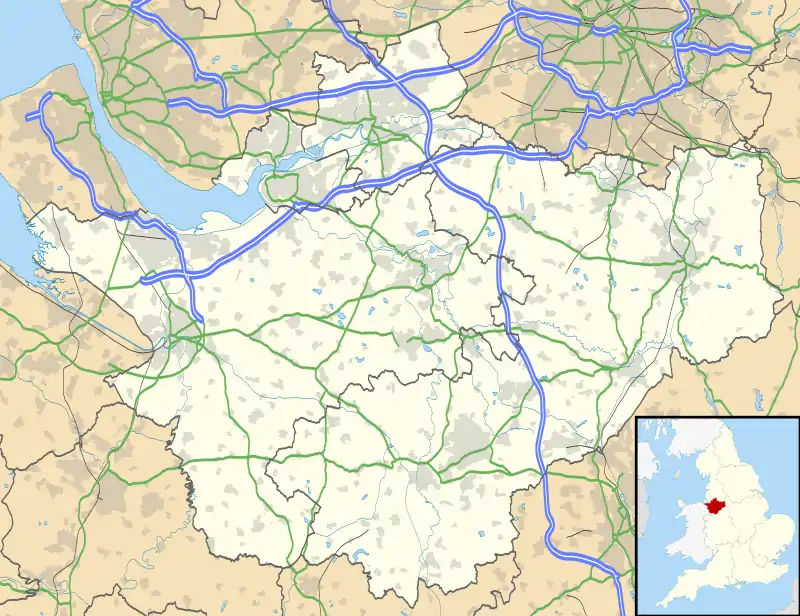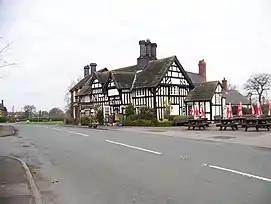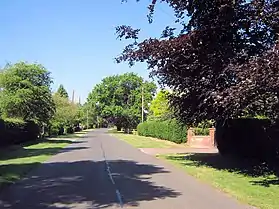Brereton, Cheshire
Brereton /ˈbrɪərtən/ is a civil parish in the unitary authority of Cheshire East and the ceremonial county of Cheshire, England. According to the 2001 census, the population of the entire civil parish was 1,012,[1] increasing to 1,190 at the 2011 Census.[2] Brereton is mentioned in the Domesday book as the Manor of Bretune.[3] The civil parish includes the hamlets of Brereton Green, Brereton Heath, Smethwick Green, Medhurst Green, Sandlow Green and Davenport. It takes its name from Britonnic bre meaning a hill and reton meaning fern or ferns, thus "Fernhill".
| Brereton | |
|---|---|
 Brereton Location within Cheshire | |
| Population | 1,190 (2011) |
| OS grid reference | SJ777642 |
| Civil parish |
|
| Unitary authority | |
| Ceremonial county | |
| Region | |
| Country | England |
| Sovereign state | United Kingdom |
| Post town | SANDBACH |
| Postcode district | CW11 |
| Dialling code | 01477 |
| Police | Cheshire |
| Fire | Cheshire |
| Ambulance | North West |
| UK Parliament | |
It also contains Brereton Hall, a Grade I listed[4] Elizabethan house that is in private ownership and not open to the public. This used to be the family seat of the Lords Brereton, but the Lordship ended in 1722 when the fifth Baron Brereton died a bachelor.[3] The adjoining Church of St Oswald is a Grade II* listed building described as "an unusually complete late Perpendicular church".[5] The Bear's Head (formerly the Boar's Head[6]) is a notable half-timbered public house, dated 1615 and also listed at Grade II*.[7]
History
The civil parish was created in 1936 by uniting the civil parishes of Brereton cum Smethwick and Davenport. Brereton cum Smethwick was an Ancient Parish in Northwich Hundred. Davenport began as a township in Astbury Ancient Parish (which has had no separate civic identity since 1866.[8]) Davenport was created a separate civil parish in 1866 which existed until the merger in 1936.[9] Both these "parent civil parishes" of Brereton had similar administrative histories: both were in Northwich Hundred, and they both later became members of Congleton Poor Law Union and Rural Sanitary District. Later still, they became part of Congleton Rural District, in which they remained until they merged.[10]
Culture
The parish has used the legend of Lord Brereton and the bear in inaugurating a unique 'scarecrow festival' called 'The Brereton Bear Festival'. The legend is that William Brereton killed his valet in a temper after he was interrupted at his meal. His punishment was to be a fight with a bear, but the King gave him three days to make a muzzle to contain the bear. After three days the bear was let loose on the lord, and luckily for him, the muzzle proved to be successful. The muzzled bear became the crest on the Brereton coat of arms.


In 2004, the Church introduced a Bear Festival to the Parish as a means of raising funds for St Oswald's church, which is now held biennially in odd-numbered years. Local residents and organisations create displays on the theme of 'Bears' – often with great ingenuity! There are prizes for both bear makers and bear hunters. The Festival takes place for five weekends during July and August. Many bear-themed events are held over the period to raise money for St Oswald's Church and local organizations.
Felicia Hemans's poem The Vassal's Lament for the Fallen Tree of 1824 refers to another legend, one she has from William Camden, that the falling of trees here foretells the death of an heir.
| Wikisource has original text related to this article: |
Brereton Heath
Brereton Heath is a country park and Local Nature Reserve (LNR) maintained by Cheshire East Ranger Service. It comprises an area of lowland heath surrounding a flooded quarry from which silica sand was extracted between 1959 and 1972. The area was opened as a country park in 1982 and designated as a Local Nature Reserve in 2005.[11] The designated LNR covers an area of 33.69 hectares (83.2 acres).[12]
References
| Wikimedia Commons has media related to Brereton, Cheshire. |
Notes
- Official 2001 Census Figures. Neighbourhood Statistics website, Retrieval Date: 23 August 2007.
- "Civil Parish population 2011". Neighbourhood Statistics. Office for National Statistics. Retrieved 13 March 2016.
- "Brereton Hall". Alsager.com. Retrieved 20 September 2020.
- Historic England. "Brereton Hall (Grade I) (1229329)". National Heritage List for England. Retrieved 30 March 2012.
- Historic England. "Church of St Oswald, Brereton (Grade II*) (1229297)". National Heritage List for England. Retrieved 30 March 2012.
- "Welcome to The Bear's Head in Brereton". Vintage Inns. n.d. Retrieved 20 September 2020.
- Historic England. "The Bear's Head Hotel (Grade II*) (1138789)". National Heritage List for England. Retrieved 20 September 2020.
- Youngs, F. A. (1991). pages 6–7.
- Youngs, F. A. (1991). page 17.
- Youngs, F. A. (1991). pages 10, 17.
- Brereton Heath Local Nature Reserve (PDF) (leaflet). Cheshire East Council. n.d. Retrieved 20 September 2020.
- "Brereton Heath LNR". Natural England. n.d. Retrieved 20 September 2020.
Bibliography
- Youngs, F. A. (1991). Guide to the Local Administrative Units of England. Volume I: Northern England. London: Royal Historical Society. ISBN 0-86193-127-0.